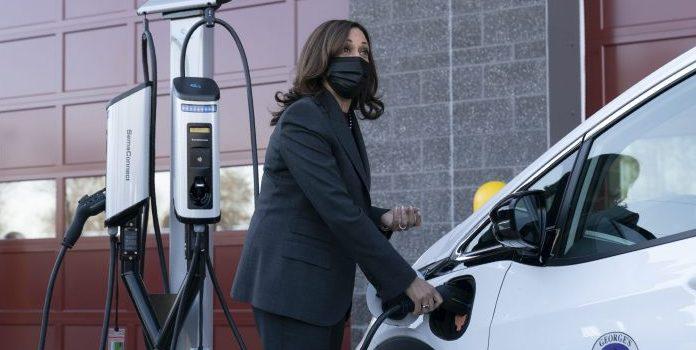(By Casey Harper, The Center Square) Opposition to new Environmental Protection Agency tailpipe regulations is growing after the federal agency projected the regulation would put more than half of American drivers out of gas cars and into electric vehicles.
As The Center Square previously reported, the EPA has projected that the proposed changes would mean that fully electric vehicles make up two thirds of all new “light duty” and 46% of new medium-duty vehicle sales by 2032. That would include most regular consumer vehicles, even SUVs and many pickup trucks. Currently, electric vehicles make up less than 5% of the market.
A group of 151 House Republicans rallied together to oppose the newly proposed rule, sending a letter to EPA Administrator Michael Regan on Monday calling the rules “unworkable and impractical.”
“The proposals are the latest effort by the Biden administration to commandeer America’s transportation sector and force its complete vehicle electrification under the guise of mitigating climate change,” the letter said.
The EPA vehicles included in the 2032 projection are “passenger cars and light trucks: minivans, passenger vans, pickup trucks, and sport-utility vehicles.”
The EPA defines heavy duty vehicles as “heavy trucks and buses: large pick-ups, delivery trucks, recreational vehicles (RVs), and semi trucks.”
Critics have blasted the proposed changes, saying it is part of a larger Biden administration effort to undermine American energy production.
“We have never advanced as a nation or as an economy when government dictates consumer choices,” Daniel Turner, executive director of Power the Future, told The Center Square. “Yet the Biden administration is using the power of government to determine what we drive and what appliances we have in our homes.”
The EPA argues the rules would improve air quality by avoiding “nearly 10 billion tons of CO2 emissions.” The proposed rule changes still face a lengthy public comment and approval process as well as dodging a potential override from Congress after the rules are enacted.
The Republican lawmakers argue the rule will give China more control over the U.S. economy.
“Furthermore, a rapid shift towards EVs would benefit only the Chinese Communist Party (CCP), as China has a stranglehold on the critical minerals supply chain and manufacturing of EV batteries,” the letter said. “For example, China currently controls 50 to 70 percent of global lithium and cobalt refining that are necessary for EV batteries.”
Another line of attack on these proposed policy changes is the increased costs for Americans. Josh Roe, CEO of the Kansas Corn Growers Association, testified before Congress last week on the impact of the proposed changes.
“EVs are $10,000-25,000 more expensive than comparable internal combustion engine vehicles, placing them out of reach for many consumers including those in rural America where median incomes are lower than that of urban areas,” he said.
Turner shares that concern.
“Americans like combustion engine cars because they are reliable and inexpensive,” he told The Center Square. “Banning them will not make EVs better, it will just make Americans less free. I haven’t seen Biden or any cabinet member drive around DC in an EV. Maybe they should lead by example rather than force Americans to obey regulations they conveniently ignore.”
Roe also cast doubt during the hearing on the environmental purity of electric vehicles.
“The EPA defines EVs as zero-emission vehicles. However, EVs are not truly zero-emission vehicles,” Roe said. “While they do not have a tailpipe, you still need to account for the emissions that come from the power grid. The U.S. power grid is currently 60% powered by coal and natural gas.
“Current and proposed EPA rules do not account for these upstream emissions when calculating compliance, let alone the additional emissions and toxic pollution generated by mining rare earth minerals around the world.”

